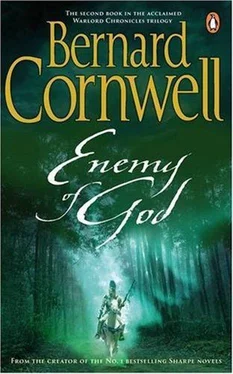‘Try to trap us, Lord,’ I said.
‘How? Where?’ he asked irritably. ‘North, yes? That’s our fastest route back to friendly spearmen and they’ll know that. So we won’t go north.’ He looked at me, and it was almost as though he did not recognize me. ‘We go for their throats instead, Derfel,’ he said savagely.
‘Their throats, Lord?’
‘We’ll go to Caer Cadarn.’
I said nothing for a while. He was not thinking straight. Grief and anger had upset him and I wondered how I could steer him away from this suicide. ‘There are forty of us. Lord,’ I said quietly.
‘Caer Cadarn,’ he said again, ignoring my objection. ‘Who holds the Caer holds Dumnonia, and who holds Dumnonia holds Britain.
If you don’t want to come, Derfel, then go your own way. I’m going to Caer Cadarn.’ He turned away.
‘Lord!’ I called him back. ‘Dunum lies in our path.’ That was a major fortress, and though its garrison was doubtless depleted, it could hold more than enough spears to destroy our small force.
‘I would not care, Derfel, if every fortress in Britain stood in our path.’ Arthur spat the words at me.
‘You do what you want, but I’m going to Caer Cadarn.’ He walked away, shouting at the horsemen to turn westwards.
I closed my eyes, convinced my Lord wanted to die. Without Guinevere’s love, he just wanted to die. He wanted to fall beneath the enemy’s spears at the centre of the land for which he had fought so long. I could think of no other explanation why he would lead this small band of tired spearmen to the very heart of the rebellion unless he wanted death beside Dumnonia’s royal stone, but then a memory came to me and I opened my eyes. ‘A long time ago,’ I told Nimue, ‘I talked with Ailleann.’ She had been an Irish slave, older than Arthur but a loving mistress to him before he met Guinevere, and Amhar and Loholt were her ungrateful sons. She still lived, graceful and grey-haired now, and presumably still under siege in Corinium. And now, standing lost in shattered Dumnonia, I heard her voice across the years. Just watch Arthur, she had told me, because when you think he is doomed, when everything is at its darkest, he will astonish you. He will win. I told that now to Nimue. ‘And she also said,’ I went on, ‘that once he’d won he would make his usual mistake of forgiving his enemies.’
‘Not this time,’ Nimue said. ‘Not this time. The fool has learned his lesson, Derfel. So what will you do?’
‘What I always do,’ I said. ‘Go with him.’
To the enemy’s throat. To Caer Cadarn
That day Arthur was filled with a frenetic, desperate energy as though the answer to all his miseries lay at Caer Cadarn’s summit. He made no attempt to hide his small force, but just marched us north and west with his banner of the bear flying above us. He used one of his men’s horses and he wore his famous armour so that anyone could see just who it was who rode into the country’s heart. He went as fast as my spearmen could walk, and when one of the horses split a hoof he just abandoned the beast and pushed on hard. He wanted to reach the Caer.
We came to Dunum first. The Old People had made a great fort on Dunum’s hill, the Romans had added their own wall, and Arthur had repaired the fortifications and kept a strong garrison there. The garrison had never seen battle, but if Cerdic ever did attack west along Dumnonia’s coast it would have been Dunum that would have formed one of his first major obstacles and, despite the long years of peace, Arthur had never let the fort decay. A banner flew above the wall and, as we drew closer, I saw it was not the sea-eagle, but the red dragon. Dunum had stayed loyal.
Thirty men remained of the garrison. The rest had either been Christians and had deserted, or else, fearing that Mordred and Arthur were both dead, they had given up their defiance and slipped away, but Lanval, the garrison’s commander, had clung on with his shrinking force, hoping against hope that the evil news was wrong. Now Arthur had come, Lanval led his men out of the gate and Arthur slid from the saddle and gave the old warrior an embrace. We were seventy spears now instead of forty and I thought of Ailleann’s words. Just when you think he’s beaten, she had said, he begins to win. Lanval walked his horse beside me and told how Lancelot’s spearmen had marched past the fort. ‘We couldn’t stop them,’ he said bitterly, ‘and they didn’t challenge us. They just tried to make me surrender. I told them I would take down Mordred’s banner when Arthur ordered me to take it down, and I would not believe Arthur was dead until they brought me his head on a shield.’ Arthur must have said something to him about Guinevere for Lanval, despite having once been the commander of her guard, avoided her. I told him a little of what had happened at the Sea Palace and he shook his head sadly. ‘She and Lancelot were doing it in Durnovaria,’ he said, ‘in that temple she made there.’
‘You knew that?’ I asked, horrified.
‘I didn’t know it,’ he said tiredly, ‘but I heard rumours, Derfel, only rumours, and I didn’t want to know more.’ He spat at the road’s verge. ‘I was there the day Lancelot came from Ynys Trebes and I remember the two of them couldn’t keep their eyes off each other. They hid it after that, of course, and Arthur never suspected a thing. And he made it so easy for them! He trusted her and he was never at home. He was always riding off to inspect a fort or sit in a lawcourt.’ Lanval shook his head. ‘I don’t doubt she calls it a religion, Derfel, but I tell you, if that lady is in love with anyone, it’s Lancelot.’
‘I think she loves Arthur,’ I said.
‘She does, maybe, but he’s too straightforward for her. There’s no mystery in Arthur’s heart, it’s all written on his face and she’s a lady who likes subtlety. I tell you, it’s Lancelot who makes her heart quicken.’ And it was Guinevere, I thought sadly, who made Arthur’s heart beat faster; I did not even dare to think what was happening to his heart now.
We slept that night in the open. My men guarded Guinevere who busied herself with Gwydre. No word had been said of her fate, and none of us wanted to ask Arthur and so we all treated her with a distant politeness. She treated us in the same manner, asked no favours and avoided Arthur. As night fell she told Gwydre stories, but when he had gone to sleep I saw she was rocking back and forth beside him and crying softly. Arthur saw it too, then he began to weep and walked away to the edge of the wide down so that no one would see his misery.
We marched again at dawn and our road led us down into a lovely landscape that was softly lit by a sun rising into a sky cleared of cloud. This was the Dumnonia for which Arthur fought, a rich fertile land that the Gods had made so beautiful. The villages had thick thatch and deep orchards, though too many of the cottage walls were disfigured with the mark of the fish, while others had been burned, but I noticed how the Christians did not insult Arthur as they might once have done and this made me suspect that the fever which had struck Dumnonia was already fading. Between the villages the road wound between pink bramble blossom and between meadows made gaudy with clover, daisies, buttercups and poppies. Willow-wrens and yellowhammers, the last birds to make their nests, flew with scraps of straw in their beaks, while higher, above some oaks, I saw a hawk take wing, then realized it was no hawk, but a young cuckoo making its first flight. And that, I thought, was a good omen, for Lancelot, like the young cuckoo, only resembled a hawk and was in truth nothing but a usurper. We stopped a few miles short of Caer Cadarn at a small monastery that had been built where a sacred spring bubbled out of an oak grove. This had once been a Druid shrine and now the Christian God guarded the waters, but the God could not resist my spearmen who, on Arthur’s orders, broke down the gate of the palisade and took a dozen of the monks’ brown robes. The monastery’s bishop refused to take the offered payment and just cursed Arthur instead, and Arthur, his anger ungovernable now, struck the bishop down. We left the bishop bleeding into the sacred spring and marched on west. The bishop was called Carannog and he is now a saint. Arthur, I sometimes think, made more saints than God. We came to Caer Cadarn across Pen Hill, but stopped beneath the hill’s crest before we came in sight of its ramparts. Arthur chose a dozen spearmen and ordered them to cut their hair into the Christian tonsure, then to don the monks’ robes. Nimue did the cutting, and she put all the hair into a bag so that it would be safe. I wanted to be one of the twelve, but Arthur refused. Whoever went to Caer Cadarn’s gate, he said, must not have a face that could be recognized.
Читать дальше












